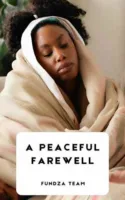“Two things are inevitable in this life: taxes and death.” This quip, often shared with a mix of humour and resignation, underscores a truth we all face. Alua Arthur, a death doula, pushes this conversation further into the light. Through her work, including her widely acclaimed TED Talk, Arthur directly addresses the inevitability of death, advocating for the vital necessity of open discussions about it. Her approach fundamentally alters our perceptions and preparations for life’s final chapters.
Halloween and Mexico’s Day of the Dead offer fascinating contrasts—festivities that celebrate death in a manner that’s both removed and engaging, yet when it comes to personal mortality, the conversation dims. Thandi, a 23-year-old graphic designer from Cape Town, reflects on this paradox. Having lost her grandmother last year, Thandi found solace in the rituals of grief and remembrance. “We celebrate the aesthetics of death but shy away from its reality. My grandmother’s passing taught me the importance of talking about death openly, not hiding from it.”
Jason, a 26-year-old educator in Johannesburg, echoes this sentiment. After witnessing the impact of a student’s unexpected death in his community, he questions, “Why can we embrace the concept of death through celebrations but remain silent on its personal impact?” Jason’s experience with loss in the school system has made him an advocate for more open discussions on mortality, believing it can foster a stronger, more supportive community.
Alua Arthur’s transition from law to becoming a death doula was sparked by an intimate conversation with a stranger about life, death, and the space in between. Her mission at Going With Grace is to demystify the end-of-life process, offering support that navigates both the emotional and logistical challenges of dying. Arthur’s work sheds light on the beauty of embracing life’s finite nature, urging us to live more fully in the present.
Mpho, a 22-year-old student from Durban, grapples with the concept of mortality after losing a close friend in an accident. “We play with the idea of death during Halloween, keeping it at arm’s length. But facing the real thing—there’s nothing that prepares you for that.” Mpho’s loss has propelled him into deeper reflections on life, legacy, and making the most of the time we have.
Arthur’s advocacy for openness around death challenges us to lean into our discomfort with mortality. It’s not about morbidity but acknowledging that understanding death can profoundly enrich our lives. This approach encourages us to cherish every moment, forge meaningful connections, and engage with our existence with intention and purpose.
In this conversation about life’s ultimate truth, we find a shared humanity—a call to confront our mortality and embrace the richness it brings to our lives. As we navigate our journeys, Arthur’s work and the stories of young individuals like Thandi, Jason, and Mpho remind us of the transformative power of facing death head-on.
Inspired by Arthur and reflected in the experiences of young people dealing with loss, this exploration into mortality invites us to ponder: How can embracing the conversation around death inspire us to live more meaningful lives? How can we transform our fear of the end into a catalyst for living with intention and love?
By breaking the silence around death, we uncover opportunities for profound engagement with life, each other, and ourselves. Arthur and other death doulas’ mission is not just about preparing for the end but about inspiring a more compassionate, connected way of living—a lesson in how facing death can teach us the most about life.
Now, over to you: How do you approach death or endings in your life, and what can we learn from the idea of death doulas to help us navigate these transitions?



